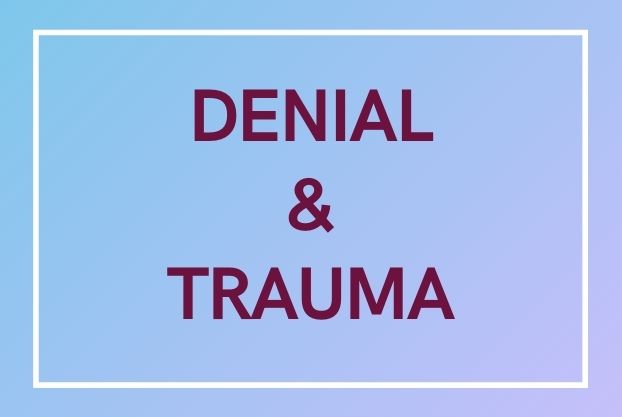Trauma manifests as several different symptoms ranging from intrusive thoughts to depression to hypervigilance. Sometimes, people find it difficult to admit that they’re going through something, as they might think of it as being “weak.” However, accepting that you are indeed suffering from trauma is the most difficult step in recovery. Admitting to being in pain does not mean that you are not strong enough to cope with life; instead, it’s an active effort on your part to heal and break yourself out of a cycle of negative behavior patterns. Owning your feelings encourages those around you to do the same, allowing you to build a space where healing is indeed possible.
Admitting pain does not mean that someone has to be blamed. Blaming someone else, even the perpetrator, does not help anyone heal from trauma; instead, healing comes from looking at oneself internally and accepting the effects of the events.
Why Do People Deny Trauma?
People often deny trauma simply as a coping mechanism. You could be in denial as a way to deal with emotional conflict, stress, pain, threatening situations and anxiety. It makes you feel like you have control; more often than not, this control is short-lasting and gives way for more pain in the future. Suppression and denial are breeding grounds for trauma symptoms.
When you’re in denial:
- You won't acknowledge a triggering/ difficult situation: these situations could include personal violence, illness, addiction, financial problems and relationship issues.
- You will minimize the consequences of the situation: statements like “it won't be that bad”, “I can handle this”, “it’s fine, I can deal with that much” will become more and more commonplace with you
- You will avoid the facts of the trauma: this could range from denying your symptoms or simply denying that you’re going through anything at all, despite the obvious signs.
Denial: Helpful versus Harmful
Denial is not usually the best way to deal with a situation. However, sometimes a painful situation can call for a short period of denial in order to allow yourself to subconsciously process the shock of that moment, as well as to prepare yourself for the challenges you will have to face. In the long term, however, it is best to ease yourself into processing your trauma in a healthy manner.
For example, you might find a lump in your throat and panic. You could deny it's an obstacle for a week or so, in the hopes that it will go away on its own. Post that short period of denial, you look for help and get the treatment you need. This type of denial is a helpful response to stressful information. It helps you absorb your situation and then react to it.
If you don’t get past this short stage of denial, it can build up to be a full-fledged, unavoidable trauma. In that case, denial will stop you from taking any action about your trauma and instead encourage you to continue with negative behavior in order to feel like you have control over the situation. Refusing help could mean refusing medical treatments, counselling or support from others- resulting in further harm for yourself and everyone around you as well. Instead of looking for help for that lump in your throat, you would continue denying it, allowing the trauma to metastasize to the point of your own detriment.
Moving past denial
With the negative consequences piling up, you might start to actually want to move past your denial. This means you need to take the time to acknowledge your trauma and feel the pain of it. At Another Light, we’re aware that it is difficult to reach out and ask for help. We’re here to help you work on expressing your emotions and fears, while building a healthy relationship with yourself. Denial is not a healthy coping mechanism; instead, it gives you temporary control with long-lasting negative consequences on your physical and mental health. Moving past denial allows you and those around you to own your feelings and actively participate in your own life

